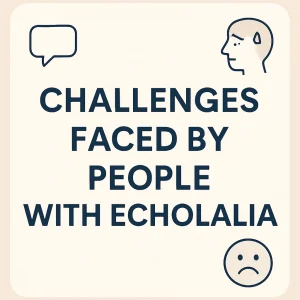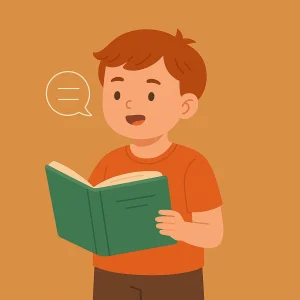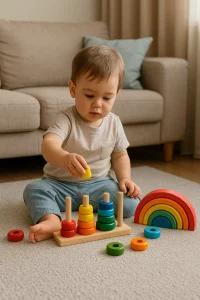First Steps After Noticing Autism Signs: A Parent’s Roadmap
By Rajini D
Last Updated: April 3, 2025
Welcome to a crucial part of your parenting journey. Recognizing early signs of autism in children can be daunting, yet understanding these signs marks the first step toward providing the right support for your child. Autism Spectrum Disorder (ASD) affects children in various ways, influencing their social interactions, communication skills, and behavior patterns. Early detection is pivotal because it opens the door to early intervention services that can significantly improve your child’s developmental outcomes.
In this guide, we aim to equip you with the essential knowledge and steps to take after you notice potential signs of autism in your child. Our goal is to offer a clear, supportive pathway that not only helps you understand what these signs might mean but also guides you on what to do next. Whether you’re grappling with concerns about your child’s lack of eye contact, delayed speech, or unusual play habits, this article will provide structured and compassionate advice.
What Are the Signs of Autism in Children?
Autism Spectrum Disorder (ASD) manifests through a variety of signs that can vary significantly from one child to another. Understanding these signs is crucial as it can guide you towards seeking the right help at the right time. Let’s explore some of the most common behavioral and communication red flags that might prompt parents to investigate further.
Also read: 5 Early Signs of Autism Every Parent Should Know
Behavioral Signs to Watch For
- Repetitive Behaviors: Children with autism often engage in repetitive behaviors. These can include lining up toys in a specific order, flipping objects, or echoing phrases repeatedly.
- Resistance to Change: A child may exhibit significant distress over minor changes in routine or environment, such as a different route to school or a change in their daily schedule.
- Unusual Sensory Interests: Pay attention if your child shows heightened or reduced sensitivity to sensory stimuli. This might manifest as a fascination with lights, certain textures, or a disregard for temperature or pain.
- Limited Interest: They might show an intense focus on a narrow range of interests, such as memorizing train schedules or playing with a single toy.
- Social Withdrawal: They might not seek to engage with peers or may prefer to play alone, showing little interest in making friends.
Communication Red Flags
- Echolalia: The child might repeat phrases and noises they hear verbatim without understanding their usage or context.
- Difficulty with Nonverbal Communication: Watch for challenges in using and understanding gestures, facial expressions, or tone of voice.
- Poor Eye Contact: A lack of consistent eye contact can be a telltale sign. Children with autism often struggle to maintain eye contact during interactions.
- Inconsistent Response to Names: Children with autism may not consistently respond when someone calls their names, suggesting difficulties with attention or understanding.
Essential First Steps for Parents After Identifying Autism Signs
Once you’ve noticed potential signs of autism in your child, the next steps you take are crucial for their development and well-being. Here, we’ll discuss how to proceed with scheduling an evaluation with a specialist and exploring early intervention services, highlighting why these steps are indispensable.
When you suspect autism, the first critical step is to obtain a professional evaluation. A developmental pediatrician, pediatric neurologist, or psychologist specializing in child development issues usually conducts this evaluation. Here’s how to proceed:
- Get a Referral: Start with your child’s primary care pediatrician, who can refer you to a specialist experienced in diagnosing autism.
- Prepare for the Visit: Gather information about your child’s developmental milestones and any behaviors that concern you. Collecting videos, keeping a diary, or making a list of behaviors can be helpful.
- Understand the Process: The evaluation will likely involve a series of observations, interactions, and possibly standardized tests to assess your child’s developmental level and other factors indicative of autism.
Know more: Early Signs of Autism in Girls: A Practical Checklist
Cultural Perspectives on Autism and Parental Response
Understanding autism within the context of various cultural backgrounds is crucial. Different cultures may perceive and respond to autism in diverse ways, influencing how parents recognize signs and seek help. Embracing cultural sensitivity can lead to more effective and compassionate approaches to diagnosis and treatment. Let’s explore the importance of respecting diverse views and adapting parental approaches to autism across different cultures.
People across the world view and understand autism differently, influenced by cultural beliefs, knowledge, and access to resources. Here’s why respecting these diverse perspectives is vital:
- Understanding Variations in Perception: In some cultures, people may view developmental delays as a natural part of the spectrum of human differences, not as medical issues that require intervention.
- Awareness of Stigma: In other communities, the stigma surrounding neurological differences can cause families to delay seeking diagnosis and treatment due to fears of social ostracization.
- Community Support: Recognizing these cultural nuances can help create support systems that are culturally appropriate and more effective.
Adapting how you approach autism can help parents navigate the challenge of seeking the best care and support in culturally sensitive ways:
- Tailored Communication Strategies: When discussing autism with family or friends from different cultural backgrounds, it’s important to tailor communication to be respectful and clear, taking cultural sensitivities and misconceptions into account.
- Inclusive Treatment Models: You can integrate cultural practices and values into treatment plans. For example, incorporating community gatherings or familiar rituals can make therapeutic interventions more engaging and less intrusive.
- Educational Resources: Providing multilingual and culturally relevant educational materials can bridge the gap between medical advice and cultural beliefs, empowering parents with knowledge that resonates within their cultural context.
Conclusion
Navigating the journey of autism can be overwhelming, but you’re not alone. At Wellness Hub, we’re here to support you every step of the way. We offer expert advice and valuable resources, and our platform is designed to help your child thrive. Don’t hesitate to reach out; explore our autism support resources and schedule a consultation today. Early intervention is crucial, and with Wellness Hub, you have a partner dedicated to providing the best care for your child. Join our supportive community and start making positive strides in your child’s development today!
Frequently Asked Questions:
1. What are the first signs of autism in children?
The first signs of autism may include limited social interaction, such as reduced eye contact and delayed speech. Children might also engage in repetitive behaviors and show significant resistance to changes in their daily routine.
2. How early can autism be detected in a child?
Autism can often be detected by 18 months of age, but some signs may become apparent even earlier. Regular screenings and evaluations are recommended to identify developmental delays as soon as possible.
3. What should I do if I suspect my child has autism?
If you suspect your child has autism, the first step is to consult with a pediatrician who can refer you to a developmental specialist for a comprehensive evaluation and possible diagnosis.
4. Why is early intervention important for autism?
Early intervention is crucial for autism as it can greatly improve a child’s development, including better social skills, communication, and learning outcomes. Early treatment can leverage the brain’s plasticity in young children.
5. What types of early intervention services are available for autism?
Early intervention services for autism may include speech and occupational therapy, behavioral interventions like Applied Behavior Analysis (ABA), and educational support to enhance learning and development.
6. How can I find autism support resources in my area?
To find autism support resources in your area, visit local health service websites, contact pediatric specialists, or explore Wellness Hub for directories of local programs and support groups.
7. What role do parents play in the management of autism?
Parents play a critical role in managing autism by early detection of symptoms, seeking timely professional help, and actively participating in intervention strategies and daily therapies with their child.
8. Can a child with autism lead a normal life?
Children with autism can lead fulfilling lives with the right support and therapies. Many achieve significant milestones in education, relationships, and employment, tailored to their individual strengths and challenges.
9. How do cultural differences affect autism diagnosis and treatment?
Cultural differences can impact how autism is diagnosed and treated, with variations in the perception of symptoms and acceptance of medical intervention. Culturally sensitive approaches are essential for effective diagnosis and support.
10. Where can I learn more about autism and get support from other parents?
To learn more about autism and connect with other parents, visit Wellness Hub’s autism support page, which offers a wealth of resources, professional guidance, and forums for sharing experiences and strategies.
About the Author:
Rajini Darugupally
M.Sc., Speech-Language Pathologist (9+ years of experience)
Rajini is a passionate and dedicated Speech-Language Pathologist with over 9+ years of experience, specializing in both developmental speech and language disorders in children and rehabilitation in adults. Driven by a desire to empower each individual to find their voice, Rajini brings a wealth of experience and a warm, genuine approach to therapy. Currently, at Wellness Hub, she thrives in a team environment that values innovation, compassion, and achieving results for their clients.
Book your Free Consultation Today
Parent/Caregiver Info:
Client’s Details:
* Error Message








